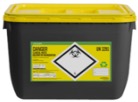Empowering you to meet regulatory and best practice requirements
Patient Safety First |

This month all pharmacy team members and Store Managers must complete three MyHub modules (available in the SOP section of the MyHub platform): Human Factors in Pharmacy, Human Factors Case Study 1 and Human Factors Case Study 2. These modules support the pharmacy team in exploring how a team member’s characteristics, their environment and the culture of the pharmacy team influence behaviours in a way which can affect patient safety, both positively and negatively. The deadline for completion of these modules is 15 June 2025.
The Patient Safety Champions’ activity for May and June focuses on embedding the use of Human Factors principles within the pharmacy team. In May, your Patient Safety Champion will discuss the Human Factors principles with the pharmacy team, using a one-page document to support this conversation. In June, your Patient Safety Champion will lead a discussion of the two cases study modules and as a team you will use your understanding of Human Factors principles to design a SMART-ER action(s) to develop patient safety, for inclusion in July’s Monthly Patient Safety review.
IMPORTANT: Sharps bins vs ECO LOC bins
|
The standard sharps bin used in the provision of pharmacy services is the 24-Litre access-protected sharps bin (Image 1). These access-protected bins MUST be in use in the consultation room to minimise the risk of needlestick injury.
Store teams offering the Boots Earwax Removal Service have been provided with 30-Litre ECO LOC bins to dispose of clinical waste only (Image 2). These look similar to access-protected bins, but they have a large opening at the top which is not access protected. These bins must never be used for sharps disposal.
 |
 |
| Image 1 | Image 2 |
NEW: Boots Pharmacy Technician Development Programme |
All pharmacy technicians should now have completed the fifth module of the programme. The sixth and final module will be available on an individual’s Boots Learning account from 1 May 2025 (provided the fifth module has been fully completed). The sixth module explores continuous learning within the leadership component and a focus on gastrointestinal health in the common clinical conditions section. In addition, the Boots Macmillan Information Technician part of the module covers living well with cancer.
IMPORTANT: Accurate record keeping of prescription details, including private prescriptions
|
Recent GPhC inspections have highlighted that the correct prescriber is not always being entered when team members are processing prescriptions, including private prescriptions.
When performing data entry of prescriptions, it is important that pharmacy team members enter the prescriber’s name, and the date that the prescription was issued. It is not appropriate to enter only the name of the company or practice, for which the prescriber is providing services, or the name of the platform from which the prescription is generated. The prescriber’s name must be recorded and if required their name should be inputted into the ‘Search Prescriber’ field in Columbus.
IMPORTANT: Medication delivery service management
|
For patients or representatives that request a regular delivery of a dispensed item(s), it is important to ensure that a Record of Delivery Service Arrangements (RDSA) form is completed. For patients that are suitable for delivery, the delivery details must be completed accurately and fully. This will help to ensure that only the authorised person(s) receives the medication delivery. The RDSA form should be reviewed with the patient or representative at least annually and following a known/
suspected change in the patients’ circumstances or following a missed delivery.
The RDSA form can be accessed on BootsLive. For further details, please see SOP VAN1.
REMINDER: Ensuring patients receive appropriate care and signposting
|
Patients should be offered the appropriate advice from a suitably trained pharmacy team member. It is important that patients are signposted appropriately depending on the type and severity of their symptoms or situation. Further information can be found in SOP AD3.
UPDATE: MHRA Drug Safety Update: Use of short-acting beta 2 agonists in asthma
|
In its Monthly Drug Safety Update in April, the Medicines and Healthcare products Regulatory Agency (MHRA) issued a reminder of the risks from overuse of Short-Acting Beta 2 Agonists (SABAs) (salbutamol and terbutaline) in asthma and for healthcare professionals to be aware of changes in the SABA prescribing guidelines. The full MHRA update is available here.
